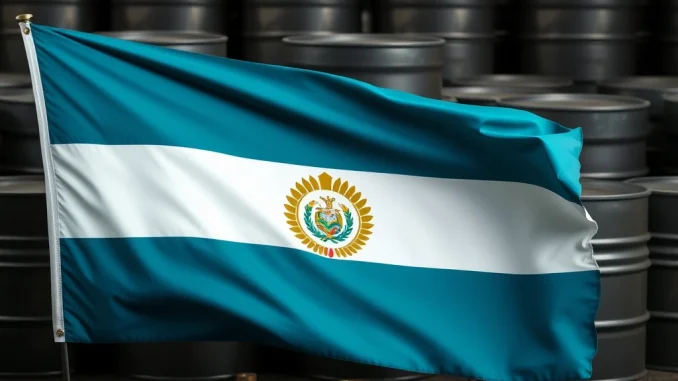
In a surprising turn of events, Bolivia has slammed the brakes on its plan to utilize cryptocurrency for importing fuel. Just when it seemed like the South American nation was warming up to digital assets to navigate economic headwinds, the Ministry of Trade and Imports has reportedly reversed course. This decision marks a significant shift, leaving many wondering what triggered this sudden change of heart. Let’s dive into the details of this intriguing development.
Why Did Bolivia Initially Explore Crypto Adoption for Fuel Imports?
To understand this reversal, it’s crucial to remember why Bolivia was even considering crypto adoption in the first place. Like many nations, Bolivia has been grappling with economic challenges, particularly dollar shortages and rising fuel costs.
- Dollar Scarcity: Access to US dollars, the dominant currency in international trade, can be restricted, making imports difficult and expensive.
- Fuel Shortages and Costs: Global fuel prices fluctuate, and import-dependent countries are vulnerable to supply disruptions and price hikes.
- Seeking Alternatives: In this context, cryptocurrencies emerged as a potential alternative to bypass traditional financial systems and directly pay for fuel imports, potentially easing the dollar dependency.
The initial proposal, reportedly backed by some government factions, suggested leveraging digital currencies to directly pay international suppliers, potentially streamlining transactions and mitigating the impact of dollar shortages. This approach was seen as a forward-thinking solution to address immediate economic pressures.
What Led to the Sudden Rejection of the Crypto Plan?
The U-turn from Bolivia’s Ministry of Trade and Imports raises several questions. Why abandon a plan that seemed promising just weeks ago? While official statements might be scarce, we can speculate on some potential reasons:
- Regulatory Concerns: Cryptocurrency regulations in Bolivia, like in many countries, are still evolving. Concerns about money laundering, illicit activities, and lack of consumer protection could have played a role. Governments often tread cautiously when dealing with unregulated or nascent financial technologies.
- Central Bank Hesitancy: Central banks globally often view decentralized digital currencies with skepticism, primarily due to concerns about monetary policy control and financial stability. The Central Bank of Bolivia might have voiced reservations about the plan’s feasibility and potential risks.
- Political Shifts: Government policies can change rapidly, especially in response to internal or external pressures. A shift in political priorities or influence within the Bolivian government could have led to the plan’s rejection.
- Practical Challenges: While theoretically appealing, using digital assets for large-scale international trade, like fuel imports, presents practical challenges. Volatility in crypto prices, transaction processing times, and acceptance by international fuel suppliers are all factors to consider.
The Implications for Bolivia and Crypto Adoption
Bolivia’s decision to step back from the cryptocurrency fuel import plan carries several significant implications:
- Setback for Crypto Advocacy: This reversal can be seen as a setback for crypto adoption in Bolivia and potentially in the wider South American region. It might reinforce skepticism among other governments considering similar measures.
- Continued Economic Challenges: Bolivia will need to continue seeking traditional solutions to address its dollar shortages and fuel import challenges. The underlying economic pressures that initially prompted the crypto plan remain.
- Uncertainty for Bolivia’s Crypto Landscape: While this specific plan is off the table, it doesn’t necessarily signal a complete rejection of digital assets by Bolivia in the long run. The government might explore other applications of blockchain technology or revisit crypto adoption in different contexts.
What’s Next for Bolivia and Digital Currencies?
Despite this recent setback, the conversation around cryptocurrency and its potential role in national economies is far from over. For Bolivia, the pressing economic realities might necessitate exploring innovative solutions again in the future.
Here are some key takeaways:
| Aspect | Details |
|---|---|
| Reversal Reason | Likely a combination of regulatory concerns, central bank hesitancy, political shifts, and practical challenges of using crypto for large-scale trade. |
| Economic Impact | Bolivia continues to face dollar shortages and fuel import issues, requiring traditional or alternative solutions. |
| Crypto Future in Bolivia | Uncertain. While this plan failed, Bolivia might explore other crypto applications or revisit adoption in the future as the technology and regulatory landscape evolves. |
| Regional Signal | May signal caution to other South American nations considering crypto for similar economic challenges. |
Will Crypto Ever Be a Viable Solution for Fuel Imports?
The Bolivian case highlights the complexities of using cryptocurrency for international trade, especially for essential commodities like fuel. While the decentralized and borderless nature of crypto offers potential benefits, significant hurdles remain:
- Volatility: Price fluctuations in the crypto market can make budgeting and long-term contracts challenging for fuel suppliers and importers.
- Regulatory Clarity: Lack of consistent global regulations for cryptocurrencies creates uncertainty and risks for businesses and governments.
- Scalability and Infrastructure: Existing crypto infrastructure might not be fully equipped to handle the volume and speed required for large-scale international trade in commodities.
- Trust and Acceptance: Widespread acceptance of crypto by fuel-exporting nations and major energy companies is still evolving.
However, the technology is constantly evolving, and as regulatory frameworks mature and stablecoins gain wider acceptance, the feasibility of using digital assets for international trade, including fuel imports, could increase in the future. Bolivia’s current rejection is a pause, not necessarily a permanent full stop.
Conclusion: A Pause, Not a Full Stop for Crypto in Bolivia?
Bolivia’s decision to backtrack on its cryptocurrency fuel import plan is undoubtedly a noteworthy development in the ongoing saga of crypto adoption. While this particular initiative has been shelved, the underlying economic pressures that drove Bolivia to consider crypto in the first place persist. The future of crypto adoption in Bolivia, and indeed in other nations facing similar economic challenges, remains open. This episode serves as a valuable case study, highlighting both the potential and the current limitations of leveraging digital currencies for critical economic functions. It’s a reminder that the journey towards mainstream crypto integration is likely to be filled with twists, turns, and perhaps, even a few shocking reversals along the way.



